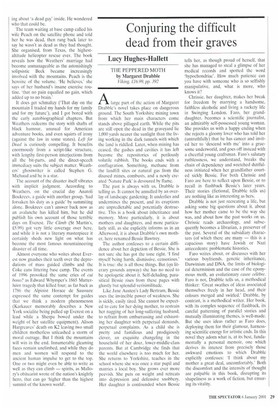Conjuring the difficult dead from their graves
Lucy Hughes-Hallett
THE PEPPERED MOTH by Margaret Drabble Viking, 116.99, pp. 392 Alarge part of the action of Margaret Drabble's novel takes place on dangerous ground. The South Yorkshire mining town from which her main characters come stands above pillaged earth. While the pits are still open the dead in the graveyard lie 1,000 yards nearer the sunlight than the living working in the dark tunnels with which the land is riddled. Later, when mining has ceased, the gashes and cavities it has left become the repositories of perilously volatile rubbish. The books ends with a conflagration. Something, methane from the landfill sites or natural gas from the disused mines, combusts, and a newly created 'Nature Park' is devoured by flame.
The past is always with us, Drabble is telling us. It cannot be annulled by an overlay of landscape gardening. It underlies and undermines the present, and its eruptions are unpredictable and potentially destructive. This is a book about inheritance and memory. More particularly, it is about mothers and daughters, and more particularly still, as she explicitly informs us in an Afterword, it is about Drabble's own mother, here renamed Bessie Bawtrey.
The author confesses to a certain diffidence about her depiction of Bessie. She is not sure she has got the tone right. 'I find myself being harsh, dismissive, censorious.' It is true: she is all those things. But (on literary grounds anyway) she has no need to be apologetic about it. Self-deluding, parasitical Bessie rises from these pages with ghastly but splendid verisimilitude.
Like Jane Austen's Lady Bertram, Bessie uses the invincible power of weakness. She is sickly, easily tired. She cannot be expected to care for her dying mother, to restrain her nagging of her long-suffering husband, to refrain from embarrassing and exhausting her daughter with perpetual demands, perpetual complaints. As a child she is pretty and fastidious and prodigiously clever, an exquisite changeling in the household of her dour, lower-middle-class parents. But at Cambridge she finds that the world elsewhere is too much for her. She returns to Yorkshire, teaches in the school where she was once a star pupil and marries a local boy. She grows ever more peevish. She puts on weight and retreats into depression and defensive snobbery. Her daughter is confounded when Bessie tells her, as though proud of herself, that she has managed to steal a glimpse of her medical records and spotted the word 'hypochondriac'. How much patience can you have with someone who is so selfishly manipulative, and, what is more, who knows it?
Chrissie, her daughter, makes her break for freedom by marrying a handsome, faithless alcoholic and living a rackety life in Swinging London. Faro, her granddaughter, becomes a scientific journalist, an admirably self-possessed young woman. She provides us with a happy ending when she rejects a gloomy lover who has told her (untruthfully) that he has cancer and invited her to 'descend with me' into a gruesome underworld, and goes off instead with a cheerful young craftsman. Faro's salutary ruthlessness, we understand, breaks the chain of dependency and wretched dutifulness initiated when her grandfather courted sickly Bessie. For both Chrissie and Faro are here to reflect upon Bessie, or to recall in flashback Bessie's later years. Their stories (fictional, Drabble tells us) are nothing like as interesting as hers.
Drabble is not just recreating a life, but asking some big questions about it, about how her mother came to be the way she was, and about how the past works on us. Chrissie reads archaeology, and subsequently becomes a librarian, a preserver of the past. Several of the subsidiary characters (of which there are many — this is a capacious story) have Jewish or Nazi antecedents: problematic histories.
Faro writes about, or discusses with her various boyfriends, genetic inheritance, Darwinism and DNA, the limits of biological determinism and the case of the eponymous moth, an evolutionary cause celdbre. Faro is not, Drabble tells us, a methodical thinker: 'Great swathes of ideas associated themselves freely in her head, and their colours merged and swirled.' Drabble, by contrast, is a methodical writer. Her book, with its complex sequence of flashback, its careful patterning of parallel stories and mutually illuminating themes, is well-made. But she uses ideas rather as Faro does, deploying them for their glamour, harnessing scientific energy for artistic ends. In this novel they adorn what is, at its best, fundamentally a personal memoir, one which derives its interest from precisely those awkward emotions to which Drabble explicitly confesses: 'I think about my mother a great deal, uncomfortably.' Both the discomfort and the intensity of thought are palpable in this book, disrupting its shapeliness as a work of fiction, but ensuring its vitality.


















































 Previous page
Previous page